Mary Kingswood's Blog, page 3
May 5, 2025
Review: The Duke’s Last Hunt by Rosanne E Lortz (2016)
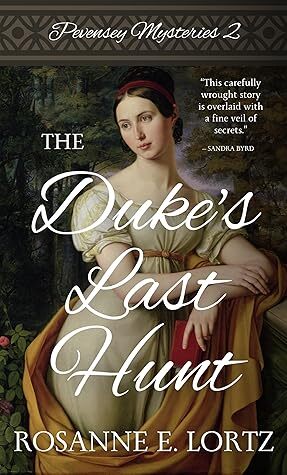 After the surprise of the first book, this one came somewhat less out of left field, but it was just as enjoyable. The whole series is inspired by real events in English history, but don’t let that put you off, since the writing is firmly rooted in the Regency.
After the surprise of the first book, this one came somewhat less out of left field, but it was just as enjoyable. The whole series is inspired by real events in English history, but don’t let that put you off, since the writing is firmly rooted in the Regency.
Here’s the premise: shy Elizabeth (Eliza) Malcolm is the unlikely recipient of marital attentions from Rufus, the Duke of Brockenhurst. Her impoverished gentry parents jump at the chance for such an illustrious match, and are delighted to be invited to the family estate, where the duke plans one of his deer hunts in the forest surrounding the house, and will, they suppose, propose. But the duke and his mother are not the only people present. The duke’s brash sister is conducting a fairly public courtship, his older half-brother is looking for more financial help, and then there’s his younger brother, the intriguing Henry Rowland, who is estranged from his brother and delights in making mischief between him and his intended. And so poor Eliza find herself in the house party from hell, with all sorts of undercurrents rippling beneath the surface, a future husband who takes very little notice of her but is uncomfortably proprietorial and his brother, who seems to be the worst kind of scoundrel, but is surprisingly gentle and thoughtful towards her.
And then there’s a sudden death. Knowing something of the historical events on which this story is (loosely) based, I was expecting it, but after that, when eccentric Bow Street Runner turns up to investigate whether this is, as it appears to be, a hunting accident or whether something more sinister is afoot, things become delightfully complex and tangled. I have to confess that the author is a master at unravelling the mystery, clue by careful clue. I loved the way it was revealed, and that everything made perfect sense.
The romance wraps up rather neatly and very plausibly. In book 1, it was the hero who found the strength to push back, but here it’s the heroine who ‘finds her voice’, as the hero puts it, and snatches her own chance of happiness. I love a heroine who displays some gumption. Another wonderful tale. Five stars. And now on to book 3.
Review: To Wed An Heiress by Rosanne E Lortz (2015)
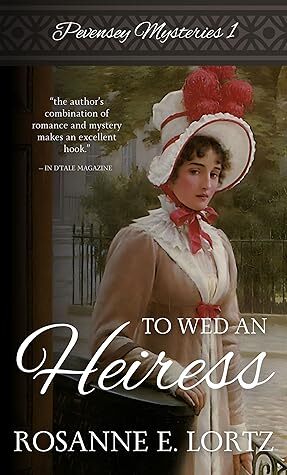 One of the joys of reading a book for the first time is not knowing precisely what lurks within its pages. Sometimes, in fact most times, if I am being honest, the plot unrolls smoothly and predictably, and that’s fine, too, but sometimes – oh, a glorious few times! – it veers off into unexpected territory. And so it is here.
One of the joys of reading a book for the first time is not knowing precisely what lurks within its pages. Sometimes, in fact most times, if I am being honest, the plot unrolls smoothly and predictably, and that’s fine, too, but sometimes – oh, a glorious few times! – it veers off into unexpected territory. And so it is here.
Here’s the premise: Harold (or Haro) Emison has, at the tender age of twenty-three, come into his inheritance as Earl of Anglesford, only to find that the coffers are empty. The options are to sell the ancient family home or… what? His younger brother Torin proposes the time-honoured solution – marry an heiress. And within days, Haro has set about doing just that, betrothing himself to the elegant person of Arabella Hastings, only daughter of cotton mill owner William Hastings. There’s only one snag: Haro was on the brink of an engagement to his distant cousin who lives with the family, Eda Swanycke, who takes the new engagement in very bad part. When the Emison family and the Hastings decamp to the ancestral home, the atmosphere is somewhat soured by the subtle sniping between the two women.
Now, at this point, it was perfectly possible that this would turn into a variant of Georgette Heyer’s A Civil Contract, as Haro and Arabella got to know each other better and reached an accommodation. So, just another marriage of convenience story, then. But this is not that story, happily, as relations between Eda and Arabella turn to open warfare, a French architect turns up set about remodelling the ancestral home into a modern Palladian masterpiece, and Haro finds himself caught in the middle, trying desperately to keep the peace in order to save his family from ruin.
And then there’s a murder. Oh. I wasn’t expecting *that*. The book now veers off sharply into murder mystery territory, complete with the eccentric detective (a Bow Street Runner, in this case), one Jacob Pevensey, whose eccentricity consists of sketching the suspects instead of taking notes. This part of the book is note perfect, the events leading up to the murder being gradually revealed, and a last-minute revelation which makes everything clear to Mr Pevensey (although I’d spotted a key point earlier). And then the romance is wrapped up, along with another reveal which wasn’t too hard to predict, either.
I see from the reviews that a lot of people disliked the two part plot, some feeling the romance was unsatisfactory, and some the murder mystery. For me, I loved the whole book, and especially that it was (to me, anyway) totally unpredictable, and I just love a book that takes me by surprise. Highlights include the sparring between the two rivals for Haro’s affections, and I liked the slow but relentless uncovering of Arabella’s unpleasant nature. I liked, too, that Haro finally realised what he needed to do to be true to himself. Some reviewers thought he was too much of a doormat early on, but I really admired the way he tried his hardest to keep everyone happy and only gave it up when he realised that it was never going to work. A terrific read. Five stars and I’m straight off to the next book in the series.
Review: Lord Glenraven’s Return by Anne Barbour (1994)
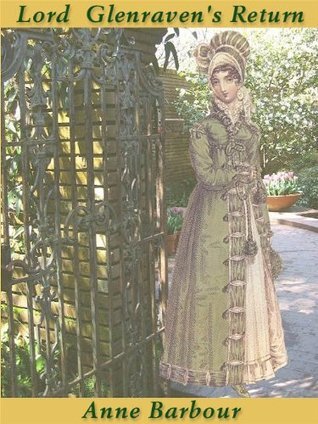 A lovely and quite unusual story of a young widow fighting to keep her independence. Modern Regencies that feature a spirited and feisty heroine who doesn’t need a man to run her life, thank you very much, are two a penny, but this one is definitely out of the usual mould.
A lovely and quite unusual story of a young widow fighting to keep her independence. Modern Regencies that feature a spirited and feisty heroine who doesn’t need a man to run her life, thank you very much, are two a penny, but this one is definitely out of the usual mould.
Here’s the premise: Mrs Claudia Carstairs is a widow struggling to make ends meet on the estate left to her by her abusive husband. There are a few sheep, and she’s trying to build a horse-breeding business, doing as much of the stable work as the hands. But one day a stranger appears in the village, asking questions about Ravencroft, and a couple of days later he turns up and asks for a job. He’s willing to work in the stables, but he’s also able to act as butler, an odd combination. But he’ll work for board and a bed, and she’s desperate, so she takes him on, and it isn’t long before one of the grooms recognises him as Lord Glenraven, whose father used to own the estate. Jem confesses that it was stolen by Carstairs and he’s come to reclaim it, but he needs proof which is hidden somewhere in the house. He swears the groom to secrecy.
So the whole plot is revealed at quite an early stage. All Jem has to do is find the proof he needs and he can turf out the widow and reclaim his property. But Claudia soon cottons on to what he’s up to, and since she doesn’t want to be turfed out, and loves Ravencroft just as much as he does, the race is on to outwit him. I’m going to be honest here – I disapproved of Claudia’s methods here. I understood why she did it, and in a way it got everyone what they wanted, but it was dishonest and it was hardly surprising that it caused so many problems later.
Along the way, there’s Claudia’s downtrodden sister and her husband, a pair who just want Claudia to accept that a woman can’t manage an estate all by herself and that she needs another husband so that she can retreat to the drawing room and be a lady as she’s supposed to, not to mention a rumbustious boy and dog. After a lot of angry stubbornness from the principals, the ending is a bit contrived, but it does feature one of the best declarations of love I’ve ever come across. Lots of minor Americanisms which didn’t bother me too badly (apart from ‘taffy-coloured’ hair! We don’t have taffy in Britain). Five stars.
April 15, 2025
Review: A Lady’s Fortune by Jane Dunn (2024)
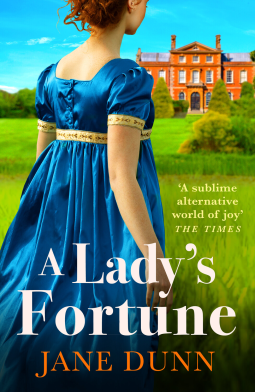 This is a difficult one for me to rate. On the one hand, there’s nothing major wrong with it, really. It just never set me alight… no, worse than that, it never even became interesting. Dull characters, predictable plot, and writing that, while competent, never sparkled.
This is a difficult one for me to rate. On the one hand, there’s nothing major wrong with it, really. It just never set me alight… no, worse than that, it never even became interesting. Dull characters, predictable plot, and writing that, while competent, never sparkled.
Here’s the premise: Leonora Appleby is twenty-seven and settling into spinsterhood. She’s about to be forced out of her childhood home since the new heir will soon be arriving to claim it. Meanwhile, on a neighbouring estate, the mysterious Earl Rokeby has returned, injured after the war, a younger brother inheriting after his brother died in battle. And for Leonora’s best friend, Charlotte Blythe, abandoned at birth on the vicar’s doorstep, there’s a change which leads both girls, and former nanny Mrs Priddy, to London for the season.
I don’t know why it is that so many authors, when they decide to dive into Regency England, are so obsessed with the London season. There are so many other interesting settings to choose from, and frankly, the tired old trope of the country ingenues adjusting to the different society of London was done to death decades ago, and to sparkling effect by Georgette Heyer herself. It’s disappointing to find so little originality in an author who is a Fellow of the Royal Society of Literature.
At least she has done her research, and a great deal of it if the repeated descriptions of clothes, furniture and architecture is anything to go by. It certainly adds colour, and if I could have done with a trifle less colour, that’s just me. There’s less excuse for the title errors. One character is referred to as both Lady Livia Dearlove and the Honourable Miss Dearlove. She can only be one or the other, not both. And the curate is referred to as ‘Curate Fopling’ throughout. Clergymen were only ever addressed as Mr Fopling (or Dr, if he was a Doctor of Divinity, like Dr Grant in Mansfield Park).
But what about the characters? The plot? The romance? Well… this is where it gets tricky. There are certain expectations for a Regency romance: it must have either a rattling plot, or appealing characterisation, or emotional depth, or scintillating dialogue. I’d like wit as well, but that may be asking a bit much. Obviously, the more of them the better, but it must have at least one of these facets to engage the reader. This book? Not so much. The plot, far from rattling, was a pedestrian affair without a single surprising feature. The characters, particularly the two females, start off well. Leonora, in particular, being older, is both sensible and intelligent, but towards the end the need for some bumps in the road to the inevitable happy ending sees her descending into stupidity. Charlotte’s silliness is more excusable given her age, but really, people, how hard is it to just tell people what’s going on and not try to do it all yourself? The two leading men were very likeable and suitably heroic, but a little bit of self-awareness of their own feelings wouldn’t have gone amiss. The villains were straight from central casting, a pair of standard-issue antagonists.
What about emotional depth? This is what I think of as the Mary Balogh effect – she may be wobbly on historical accuracy, and her characters behave in some wildly peculiar ways, but she makes me cry every single time. This author, not so much. For one thing, time after time she tells us what the characters are thinking and feeling, instead of showing us. And then she headhops with gay abandon, jumping from one character’s point of view to another even within the same paragraph. All of that serves to distance the reader from the characters, so when we really should be feeling their pain or fear or anger, we never do. And the big reveals are just tossed out there, without any emotional resonance at all. Not that they were surprising or anything, but still.
As for scintillating dialogue, I cut the author some slack here, because it’s a hard thing to do, and genuine wit is as rare as hen’s teeth. I don’t think I laughed once while reading this. Even so, there were some very intense exchanges between Leonora and Lord Rokeby (and sometimes in some bizarre places – a ballroom, for instance, or a carriage with the chaperon ‘pretending’ to sleep). I should perhaps mention that Mrs Priddy must be the world’s worst chaperon. She sat with her knitting at the ball, leaving her charges unattended, and at the end, Leonora and Rokeby are stripping off and getting hot and heavy while she (again) ‘pretends’ to sleep! Ridiculous.
This seems like a long catalogue of complaints, and it is, I suppose, but it’s more from disappointment than anything else. There are plenty of Regencies that I can get through despite a multitude of errors because I don’t expect much from them, but Jane Dunn is a different case (a Fellow of the Royal Society of Literature, for heaven’s sake!). So it ought to be literature, right? And perhaps at some level that I don’t fully appreciate, it is. Maybe I’m so attuned to the entertainment end of the genre that I can’t see a good book when it’s in front of me. But my personal requirement is to be entertained. If the author can’t tell a good story which draws me in and immerses me in the lives of these people, then I’m going to mark it down. I’d have given it two stars except that there’s some lovely writing in the descriptions of settings and clothes, so I’m going to be generous and go for three stars.
Review: The Vicar and the Village Scandal by Rosanne E Lortz (2023)
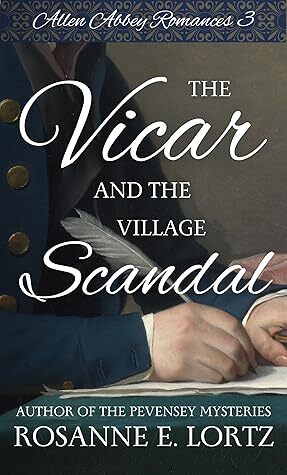 It’s always interesting to revisit the bad guy from an earlier book and see him reformed and finding his own happiness. It’s a hard act to pull off, and I think the author cheats a little here – we don’t actually see Thomas reform himself, he just appears at the start of the book, several years later, so far reformed that he’s a curate in an impoverished rural parish, now living a blameless life. He’s then given the living at his old home, where everyone remembers him from his wild former existence, and he has an uphill task to convince everyone that yes, he really has changed. And it doesn’t help that a mysterious woman appears and deposits a boy of eight on his doorstep, before disappearing again. Is the boy Thomas’s?
It’s always interesting to revisit the bad guy from an earlier book and see him reformed and finding his own happiness. It’s a hard act to pull off, and I think the author cheats a little here – we don’t actually see Thomas reform himself, he just appears at the start of the book, several years later, so far reformed that he’s a curate in an impoverished rural parish, now living a blameless life. He’s then given the living at his old home, where everyone remembers him from his wild former existence, and he has an uphill task to convince everyone that yes, he really has changed. And it doesn’t help that a mysterious woman appears and deposits a boy of eight on his doorstep, before disappearing again. Is the boy Thomas’s?
It’s not surprising that everyone is suspicious. Mary Bates, eldest daughter of the smith and Abbey steward, is willing to believe in him, but her father isn’t and forbids her to have anything to do with him, thus providing basically the only obstacle to what would otherwise be a perfectly smooth romance. There’s a lovely moment when Thomas first sees Mary again, with one of her younger brothers in tow. He remembers her very well as the prettiest of the village girls, but he assumes she must be married, especially as he sees her with a young child in tow (her brother, as it happens). “Mrs… er?” he says, and it comes across as though he doesn’t remember her at all.
From then onwards, things unfold pretty much as expected, with both Mary and Thomas trying very hard to abide by her father’s strictures (which is completely in line with Regency mores, so no problem there), and Thomas trying both to do his best for the boy left in his care, while also convince the locals that he really has become an upright citizen. My only quibble is a legal one: no, you can’t legitimise an illegitimate child by marrying, not in England, at any rate.
A nice read, a suitably romantic ending and a good four stars.
Review: The Village Spinster by Laura Matthews (1993)
 A sweet and undemanding tale with no real villain, no great misunderstandings and no improbable plot developments (elopements, kidnappings, highwaymen and the like). Sensible, mature protagonists and a low key but slowly growing romance. It sounds as if nothing happens, and perhaps that’s true, but I found it a delightful read all the same.
A sweet and undemanding tale with no real villain, no great misunderstandings and no improbable plot developments (elopements, kidnappings, highwaymen and the like). Sensible, mature protagonists and a low key but slowly growing romance. It sounds as if nothing happens, and perhaps that’s true, but I found it a delightful read all the same.Here’s the premise: Clarissa Driscoll used to be the daughter of Pennhurst, the local manor house. Unfortunately, her father gambled away the family fortune, leaving her almost destitute. Now, as a spinster of twenty-seven, she lives in a tiny cottage in the nearest village with a maid of all work, scraping a living by teaching the sons and daughters of the local gentry, in particular Aria, the fifteen-year-old sister of the Earl of Kinsford, and her seventeen-year-old brother, William (when he isn’t at school). The earl is a distant guardian, spending most of his time in London, and the children’s mother is even more hands-off, even though she lives in the same house. So Clarissa is almost the children’s only respectable friend.
The interesting point is that Clarissa and Alexander (the earl) have some history, having shared a passionate kiss some years ago. Then life intervened, he spent some years in the army, she was reduced in status and now they’re merely distantly polite neighbours. When he comes home to find out why William has been rusticated from school and discovers that Clarissa has already dealt with the situation in her own forthright way, he is understandably aggrieved. But when Aria has a fall from her horse, and ends up recovering at Clarissa’s cottage, the two are thrown together far more than before and things come very much to the boil, aided by Aria, who decides to play matchmaker by prolonging her illness to keep throwing Alexander and Clarissa together.
A number of reviews complain that there’s no sign of the romance until the very end of the book. I disagree. It’s obvious to me that even though they argue constantly early on (or rather, Alexander gets very cross and Clarissa speaks her mind forthrightly) there’s still a very strong attraction between them. In particular, Alexander’s concerns about the amount of time Clarissa spends with her (male) cousin (long walks in the countryside! Sitting together indoors unchaperoned!! Waltzing!!!) are driven by jealousy. The development of the romance is certainly subtle, but I thought it was very clear. There’s one conversation in particular, where he first calls her by her Christian name, that positively crackles with unexpressed romantic tension (a beautifully written scene).
The final chapters break out almost into farce, with the arrival of the cousin’s previously unseen wife, and the children’s mother, as well as the rest of the regular cast, all crammed into Clarissa’s little cottage. It was hysterically funny without ever going over the top, and finished up with a fine romantic denouement. Lovely stuff, and apart from a smattering of Americanisms, perfectly written. Five stars.
Review: The Lady In The Moneylender’s Parlour by Rosanne E Lortz (2023)
 Not as frothy and funny as the first in the series (The Gentleman in the Ash Tree), and more conventionally set against the backdrop of the season, but still a lovely read with two appealing romantic characters, a villainous villain, some surprisingly deep business to do with slavery and a suitably happy ending.
Not as frothy and funny as the first in the series (The Gentleman in the Ash Tree), and more conventionally set against the backdrop of the season, but still a lovely read with two appealing romantic characters, a villainous villain, some surprisingly deep business to do with slavery and a suitably happy ending.Here’s the premise: William Allen is in pretty miserable shape after losing a hand at Waterloo and burning through what little money he had in drink and gambling. None of which served to cheer him up. Down to his last few coins, he’s desperate enough to turn to a moneylender for help. But while waiting to see him, he encounters an old acquaintance, Margaret Blackburn, the sparky younger sister from the previous book. She’s there to raise money to pay a publisher to publish a book she’s written. Horrified, William offers to help her stay out of the moneylender’s clutches. He’ll pretend to court her to ensure her mother doesn’t whisk her away from London before she’s raised the money for the book by some other means. It means he’ll have to turn to his rich relations for help (a duke and duchess! Why ever didn’t he ask for their help before? That’s what well-connected relations are for), and he’ll have to become respectable again, but he’s sensible enough to realise that’s no bad thing.
And so they start their cunning scheme and needless to say, it quickly become obvious they’re made for each other, they just don’t realise it yet. And of course there’s the tricky business of her thinking he’s just helping her out in a gentlemanly way, and him thinking a one-handed man with no income is hardly a proper suitor for a beauty like Margaret. And into this awkward situation comes a certain Lieutenant Charles Russell. He has some history with Margaret, having made an assignation to elope with her in a previous season, which she had no intention of keeping (she slept peacefully through it). Russell was only deterred by William, who punched him on the nose when he found out about it. So Russell still wants Margaret, and also wants vengeance on William. Cue much villainous villainy.
Running in the background to all this is the issue of slavery, which was a real hot potato in the Regency. Even though slavery was illegal in Britain (and had always been so), many plantation owners and shipping magnates had made fortunes from the slave trade, but the tide was now turning in favour of the abolitionists. A lot of modern Regency authors throw in a sympathy for the abolitionists to demonstrate that their hero or heroine is a right-thinking person, but Lortz has done her homework here. Not only is the slavery issue woven into the whole plot, rather than being a throw-away line or two, but she’s also made use of real historical events to illuminate the subject. It’s very elegantly done, so kudos for that.
The hero and heroine suffer through the usual shenanigans by the villain, and overcome them in surprising (but very believable) ways before cruising to the inevitable happy ending. A thoroughly enjoyable read, with no noticeable issues to tweak my oversensitive pedantic historical accuracy meter. I missed the lightness of the previous book, however, which keeps it to a very good four stars.
Review: The Unexpected Duke by Julia Justiss (2025)
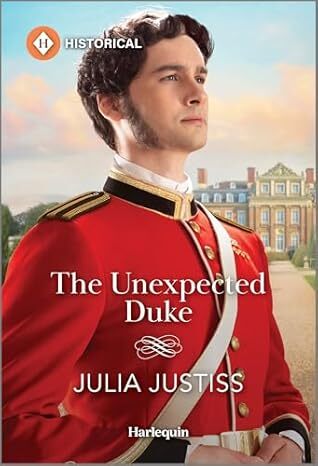 This is a book of two halves. The first half is slow as treacle, repetitive and bogged down with unnecessary detail. The second half is alive with delightful banter and the slowly burgeoning romance with a wonderful, emotional ending.
This is a book of two halves. The first half is slow as treacle, repetitive and bogged down with unnecessary detail. The second half is alive with delightful banter and the slowly burgeoning romance with a wonderful, emotional ending.
Here’s the premise: with a title like ‘The Unexpected Duke’, the plot is laid out from the very first page. Lieutenant Hartley is forced to relinquish his army career to take up the role of Duke of Fenniston after the sudden death of his cousin. He hasn’t rushed back from the continent, in case the late duke’s young wife should produce an heir. Now that hope of that possibility has gone, there’s no choice but to take up the reins of his new position. To say he’s reluctant is an understatement. He’d enjoyed the army life, but feels totally unsuited for his new responsibilities. At Steynling, he finds the sickly duchess keeping to her rooms, but her sister, the widowed Claire Hambledon, is running the house and estate, and although hostile to the upstart outsider, she’s willing to dutifully help him find his feet – and find a duchess for himself.
The central conceit of the book is laid out from the start. He accepts that he must find himself a suitable duchess, and is quite happy to let Claire help him, as well as showing him how to manage his estates. She wants him to find the right woman, but doesn’t for one moment consider that she might be the one. And yet they have the hots for each other almost from the first moment they clap eyes on each other.
And here’s the thing: how can she not be suitable, when her own sister is the current duchess? If one sister is acceptable, why on earth would the other sister not be? And this is in essence the only obstacle to the romance. Frankly, it’s silly.
I confess that the transition from sort of enemies (even if quivering with lust) to very friendly indeed is nicely handled. The first half of the book is heavy with details of the estate management which frankly I found tedious. We really did not need to know the names of all the tenants and the stories of their lives. It was especially tedious since Claire seems to know everything there is to know about them, down to the name of the smallest infant and the crops yields and the whole nine yards, and Hart is the typical perfect new overlord, kindly and generous and sympathetic and a very fast learner. Yawn.
But then things get a bit hot and heavy and although they pull back from the brink, Hart decides to make a running joke of their attraction, and so the second half of the book lightens up considerably. Happily the move to London for the season and duchess hunting is skipped over with a light touch, and eventually Hart realises they have to be together. And then she won’t have him, and so he becomes truly the hero with a glorious and truly romantic ending that shows he’s finally understood her.
I don’t recall whether there’s any sex in the book, but there is some fairly graphic lusting all the way through. I don’t have many criticisms of the writing, apart from a number of minor Americanisms (like ‘go do’ instead of ‘go and do’), trivial stuff, and some missing words that a final edit should have picked up. There are a couple of oddities, though. The main house switches from Steynling Cross to Steynling Hall and back again randomly, and the book is set in 1813 (written explicitly at the opening chapter, and confirmed by historical events), but the blurb says 1830s. That’s just careless.
Still, I enjoyed it and would have given it five stars if not for the dull patches in the first half and that silly assumption that the sister of the current duchess isn’t suitable duchess material. But a good four stars.
March 21, 2025
Review: For Duty, Love and Honour by Jenny Hambly (2025)
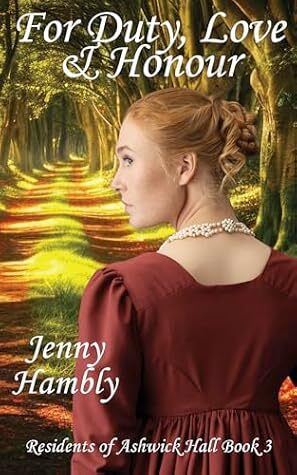 A new Jenny Hambly book is always a joy to read, with endearing characters, an intricate plot, just the right degree of mystery versus romance, and a beautifully realised Regency world. I’m loving this series with its heroines with a traumatic past hiding away from the world and gradually finding a new way forward.
A new Jenny Hambly book is always a joy to read, with endearing characters, an intricate plot, just the right degree of mystery versus romance, and a beautifully realised Regency world. I’m loving this series with its heroines with a traumatic past hiding away from the world and gradually finding a new way forward.
Here’s the premise: Anne Huxley is in hiding at Ashwick Hall under the auspices of Lady Westcliffe, who provides a home both for orphans and for ladies suffering from the travails of a difficult life. She provides a safe haven until they are ready to face the world again, albeit still in hiding, perhaps. For Anne, her opportunity comes when a naval captain advertises for a governess. Anne travels to London for an interview, competing against many other potential governesses, among them an elderly lady, Miss Burdock.
Captain Edward Turner has braved many dangers at sea, but when his mentor dies and bequeaths him an estate and he takes on the two neglected and wild daughters of a fellow naval man, he’s completely lost. He has no idea how to manage the estate, and a succession of governesses make no headway with the two children. So he decides to let them be part of the selection process for the next governess. But that brings a quandary, for they like the kindly Miss Burdock, while he prefers the coolly ladylike Mrs Huxley. But when Miss Burdock falls victim to a pickpocket and looks to be near destitution, Anne has a novel solution – why not two governesses, splitting the salary between them?
I have to say, I really like this idea, which is one I’ve never encountered before. For Anne, it gives her protection in what is a bachelor household, the children get twice the attention, and Miss Burdock is saved from the workhouse. Needless to say, the wild children respond quickly to Anne’s firm insistence on good manners and Miss Burdock’s kindliness, and Edward responds to some of Anne’s other qualities. I liked that he found her rather too cool at first, despite being an excellent governess, but as he comes to know her better and sees her in more challenging situations, he comes to admire her in a very different way. And she follows a similar process, finding him a dour, reserved man, but soon learning to appreciate his resourcefulness.
Running in the background is the mystery part of the story, both Anne’s history and also some mysterious goings on in Edward’s naval career, too. I confess I’m a little uneasy about the theme of slavery and abolition which drives some elements of the plot. It’s conventional in modern Regencies that heroes and heroines are against the slave trade, and only villains support it. It’s too easy, perhaps, for modern authors to use slavery as a quick signal of a good or bad character without really engaging with the subject meaningfully. In reality, it was a lot more nuanced than that, with strong voices on both sides. Happily, Hambly brings some depth to the subject by describing the naval engagements to take slave trading ships and release their captives.
As always with this series, the heroine’s past blows up in spectacular fashion, with a surprising revelation and a fairly dramatic confrontation, allowing both hero and heroine to display their courage. There are quite a few loose ends to be tied up in the final chapter, followed by a sweet romantic finale. Another excellent entry in this series. Five stars.
Review: Mrs Merritt’s Remorse by Christina Dudley (2025)
 For the first quarter or so of the book, I wondered if this was going to be that rare creature – a Dudley book that falls short of five stars. But no, as always she pulls it off with aplomb, and a little help with the happy ending from that most amiable of barons, Lord Dere.
For the first quarter or so of the book, I wondered if this was going to be that rare creature – a Dudley book that falls short of five stars. But no, as always she pulls it off with aplomb, and a little help with the happy ending from that most amiable of barons, Lord Dere.Here’s the premise: in book 1, Barstow daughter Jane made a terrible mistake, by eloping to marry a man who was handsome and charming and everything that was desirable, but also unreliable. When his aunt, from whom he expected to inherit, cuts him off without a penny, he ends up in the Fleet debtors’ prison. Happily (I suppose) he died there, too, leaving Jane to return home a broken woman, widowed and disgraced. For two years, she’s hidden herself away at the Barstows’ grace-and-favour cottage, venturing forth only to church.
But then comes a change. The vicar needs to go away to recover his health, so he installs a temporary curate in his place, and wouldn’t you just know it, but Philip Egerton is handsome and vibrant, a thoroughly good man who’s everything that Jane’s husband wasn’t. The arrival of Philip and his sister Cassandra is the spark which gets Jane back into the world again, which is a good thing, and there’s an obvious spark of attraction between them, too. But frankly the early chapters, featuring a rash of coincidental encounters, sometimes literally bumping into each other and edging into outright farce, are all a bit too silly for me, and Philip comes across at this point as a bit of a sanctimonious twit (or ‘parsonish’, as one character calls him). Not a particularly appealing hero.
Fortunately, Jane is everything that’s endearing, and the Barstow family is its usual rumbustious and totally loyal self. Dudley writes wonderful families, and here’s another one which is a joy to be allowed to mingle with. And into this setting arrives a character who is not endearing at all, the irritating, flirtatious and entitled Mr Beck, who singles Jane out at once as the target of his tomfoolery, and it never once crosses his mind that his attentions might be unwelcome. After all, she’s a disgraced woman, so she’ll be grateful for any man who’ll have her, on whatever terms, won’t she?
Philip also has an alternative love interest, in the delectable person of the very beautiful Miss Hynde, only eighteen years old but featuring very firmly in his future plans. His fellowship from Oxford (achieved), a curacy (achieved), a living, in time, and then… marriage to Miss Hynde. And somehow, his self-knowledge not being very great, it never crosses his mind that his infatuation with Miss H is wearing off and a certain widow is featuring more prominently in his thoughts.
The two dance around each other for virtually the whole book, with the scoundrelly Mr Beck causing mayhem, and both Philip and Jane behaving with less than gentlemanly/ladylike restraint. There are some fun side characters (I love the gossipy Mrs Lamb at the inn!), Dudley’s trademark quotations on every chapter and thank heavens for a book that’s genuinely funny!
I must also add a modest paean of praise for the timid baron, Lord Dere, who appears to be thoroughly henpecked by his widowed sister-in-law, Mrs Markham Dere, but rises to the occasion beautifully when honour and justice demand it. He’s a bit of a plot device, parachuted in to resolve tricky problems, but I love the fact that he’s so different from the usual run of lords in Regencies, who tend to be arrogant, aggressive, randy or grumpy.
Everything is resolved satisfactorily at the end, albeit with another coincidence, but Dudley seems to specialise in those, so I won’t quibble. And I loved Philip’s explosion in the inn yard – a moment to savour. Another great read, highly literate and intelligent, and with (shock horror!) a bit of a moral to it, if lightly made. An excellent five stars.



